Customer trust has always been a big deal. But Vanessa Mitchell, a senior journalist at CMO, says it’s more important than ever.
Customer trust is a key brand differentiator that can make or break a business. It’s integral to a company’s self-perseverance and long-term sustainability. That’s why it’s something that brands need to take seriously.
One area where customers are particularly vulnerable is when they’re giving out personal information. If mishandled, it can make them victims of identity theft, which can affect their finances, create stress and take an emotional toll.

What Are Trust Badges?
Trust badges (or trust seals) are a way brands are put their customers at ease. But do they really work? Will trust badges make customers feel more comfortable handing over sensitive information online and increase your conversions and sales?
I recently did a TON of research to answer the above questions. And today, I want to share with you my findings. Plus, how you can use them to inform your marketing strategy.
Trust Badges: What You Need to Know
4. How Impactful Are Trust Badges?
5. Trust Badges Are Important for SMBs
1. Payment Security Concerns
Shopping cart abandonment is an issue that plagues many e-commerce stores. Barilliance reports that on average, brands lose 75 percent of sales because of this. And in some industries, the average shopping cart abandonment is as high as 83.6 percent.
One of the main reasons for this high average is concerns about payment security. Statista found this was the primary reason that 15 percent of US digital shoppers abandoned their shopping carts in 2015.
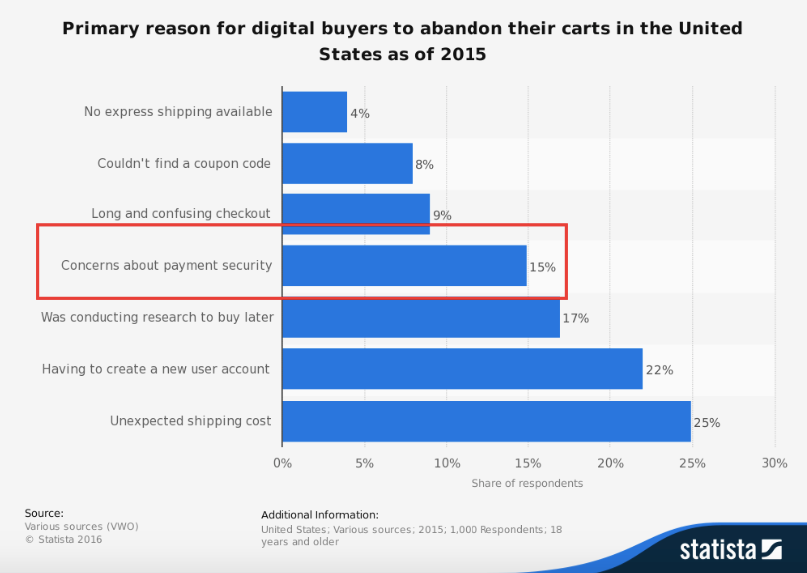
That number grew to 19 percent in 2017, according to the Baymard Institute.
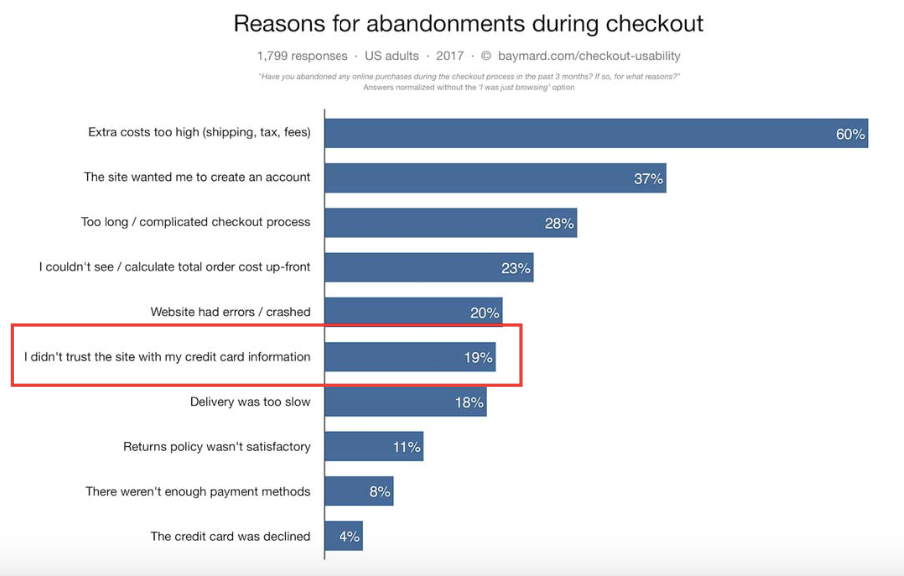
And this is totally understandable. Data security has been a huge problem as of late. It’s nearly impossible not to hear about a recent data breach in the news. Just look at how frequently data records are lost or stolen, according to Breach Level Index.

It’s over 6 million records every day and 71 every second. That’s crazy! No wonder people are little skittish about forking over their personal information. Any carelessness on the company’s end and they can wind up in big trouble. Highly sensitive payment information can end up in the hands of cybercriminals, opening a huge can of worms.
So consumers want to know that any company they do business with is following online security best practices and their payment information will be safe.
If there’s any doubt, a good portion of online shoppers simply won’t go through with the transaction. And this goes beyond online payments. Many people aren’t comfortable with sharing personal information on sign up pages, information portals and so on.
2. Trust Badges as a Solution
To combat this problem, more and more companies are adding trust badges to their sites.
“A trust badge is a symbol placed on your website that ensures your visitors that the page is legitimate and that all their data is collected through secure third-party service providers,” Omniconvert explains.
“The trust seal company that agrees to place their badge on your website confirms that your business is authentic, therefore users know that all processes taking place on your website are safe and secure,” they add.
With just a glance, consumers know that you’re taking measures to keep their information secure, which helps your brand appear more trustworthy.
Here’s an example of trust badges in action.
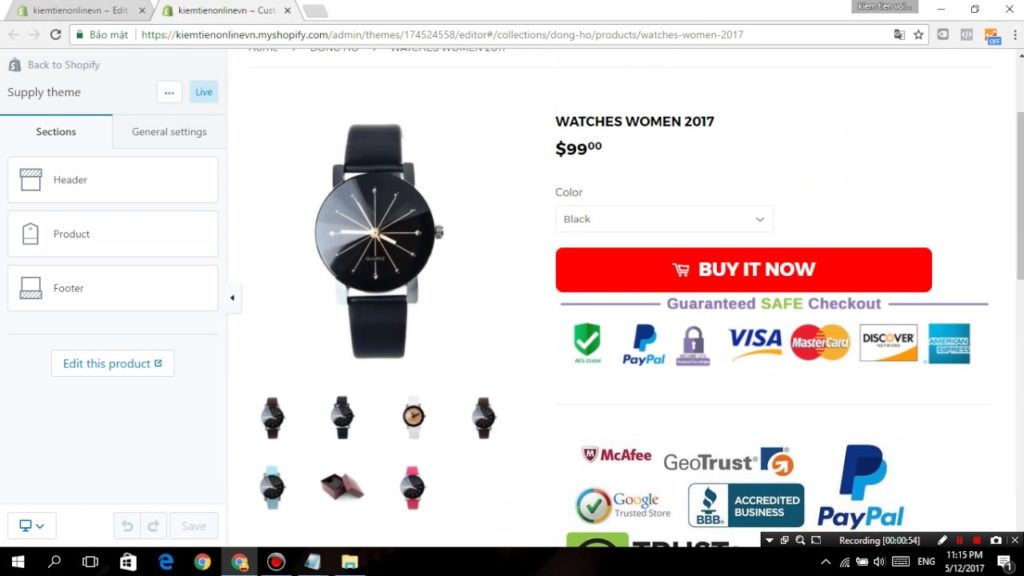
If there was any doubt as to your company’s level of online security, a trust badge should put it to rest. Or at the very least, reduce a customer’s anxieties.
3. Do Trust Badges Work?
Sure, trust badges look good and add an air of professionalism. But do they have a legitimate impact? The answer is yes.
Numerous studies have found that there is a positive correlation between trust badges and increased conversions and sales.
One involved New York-based digital marketing agency Blue Fountain Media. They performed a simple A/B test on their sign up page to see what effect adding a Verisign trust badge would have.
Here’s what the original page looked like without the Verisign trust badge.
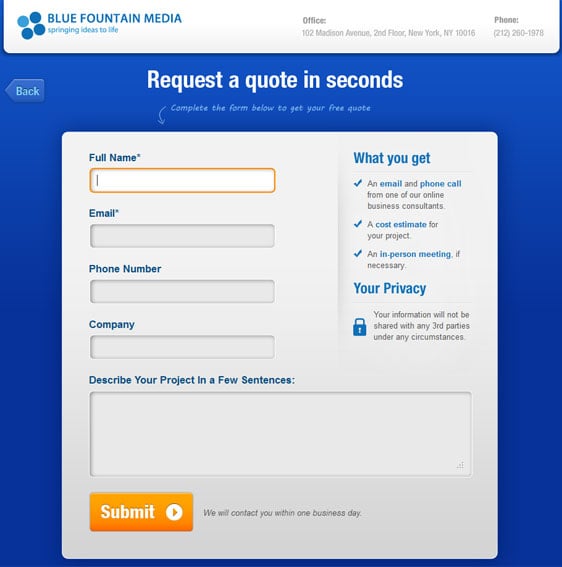
And here’s what the test page looked like with the Verisign trust badge.
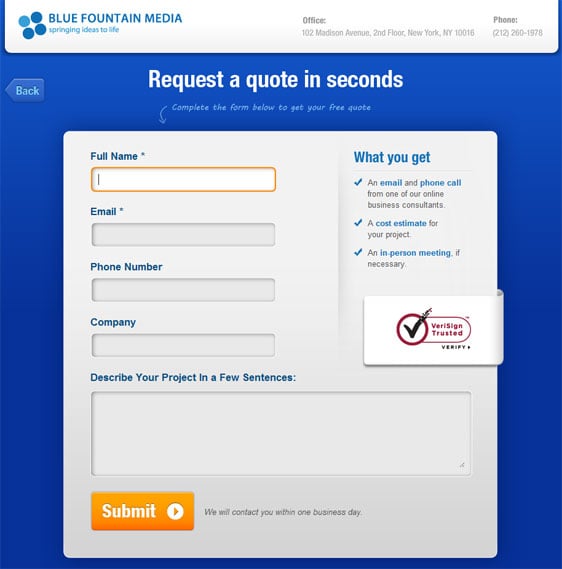
The result? Far more people trusted the second test version with the trust badge, and it led to a whopping 42 percent increase in sales. Their data found that this simple change helped visitors feel more confident about providing Blue Fountain media with their personal information.
Another example is Virtual Sheet Music, a company that provides downloadable sheet music for piano, guitar, violin, and other instruments. The company initially used a Verisign trust badge but removed it due to contractual agreements.
When this happened, they experienced a noticeable drop in sales. But once they put the trust badge back on their site, conversions increased by 31 percent. Virtual Sheet Music then went on to switch to an EV SSL Certificate, which resulted in an additional 13 percent in sales.
Yet another study involved solar energy solutions provider, Clean Energy Experts. Adding a Verisign seal to their information portal helped them boost conversions by an astonishing 137 percent.
While I can’t say that every single brand will experience a dramatic lift in conversions by adding a trust badge, it’s clear that many companies do see a positive impact.
If you’re experiencing issues with shopping cart abandonment, aren’t getting the conversions/sales you want and generally want to build more trust with customers, this is a great way to do it.
4. How Big of an Impact Do Trust Badges Have?
Actualinsights* asked study participants two key questions to see how big impact trust badges had.
Here’s the first question.

As you can see, over 60 percent of consumers didn’t make a purchase simply because there were no trust badges. Apparently, they still had a significant amount of doubt regarding a brand’s security measures when trust badges weren’t present.
Here’s the second question.

A whopping 75 plus percent of people didn’t buy because they didn’t recognize the particular logos. This shows that it’s also important to use the right trust badges—ones that people recognize.
Failing to include them or using the wrong ones can be a potential deal breaker.
5. Trust Badges Are Especially Important for SMBs
I should also point out that trust badges tend to be more important for SMBs than much larger businesses. Companies like Amazon, Target and Best Buy are already large, well-established brands. People already know who they are, and there’s a fairly deep level of built-in trust.
However, SMBs aren’t as well established. People may have never heard of a particular SMB, making it more difficult to gain their trust when providing sensitive information. Therefore, it’s the smaller companies that usually benefit the most by adding trust badges.
6. Which Trust Badges Work the Best?
Here’s the thing. It’s vital that you choose the right trust badges on your site. With so many different options available, you want to be sure to use the ones customers feel the most comfortable with.
So how do you know which trust badges to use? To find out, there are a few studies that I’d like to highlight.
One is a bit old from actualinsights* back in 2011, but it offers some nice data. They performed a study that asked consumers about 20 different trust badges and which ones they recognized most.
Here are the specific ones they tested.
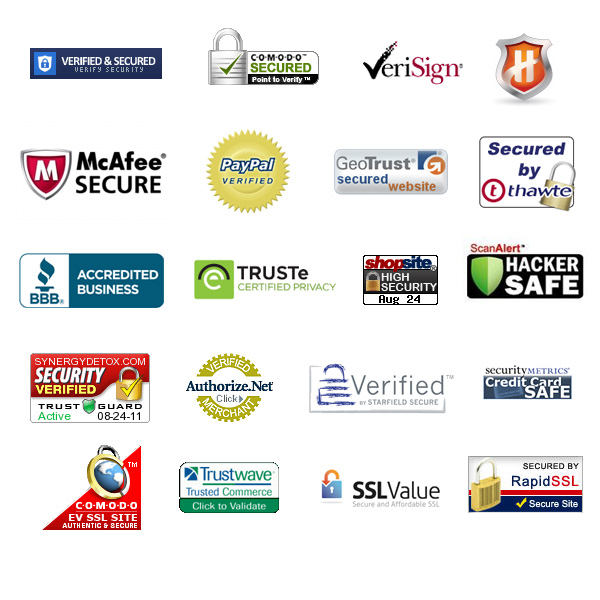
And here’s a heat map indicating which ones consumers recognized the most.
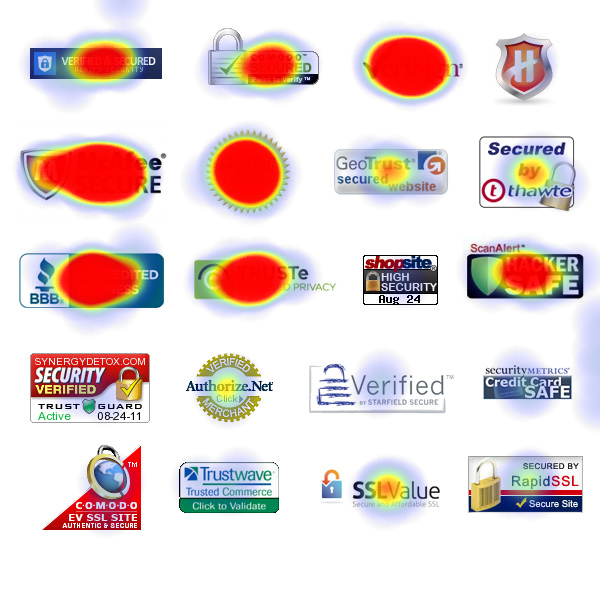
Looking at these results, we can tell that the following had the best recognition:
- McAfee
- Verisign
- PayPal
- Better Business Bureau
- TRUSTe
A separate study by The Baymard Institute in 2013 asked respondents, “Which badge gives you the best sense of trust when paying online?”
Here’s a graph of what they found.
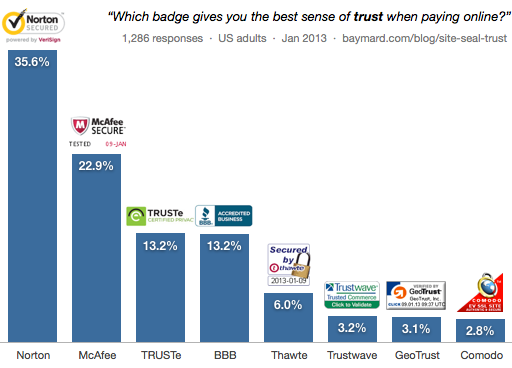
There’s quite a bit of overlap with the study from actualinsights*, and they also found that McAfee, TRUSTe and the Better Business Bureau were well recognized and trusted. They also found that Norton (which at the time was powered by Verisign) was the most trusted of all.
A final study by ConversionXL had similar findings.
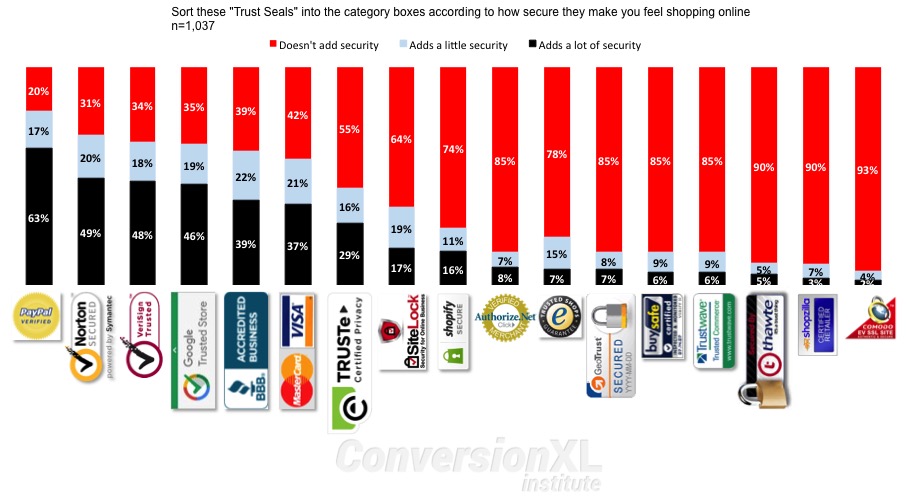
They found that the top trust seals were:
- PayPal
- Norton (now powered by Symantec)
- Verisign
- Google Trusted Store
- Better Business Bureau
- Mastercard/Visa
- TRUSTe
Put all of this data together, and some clear leaders emerge.
(Note: the Google Trusted Store program was closed in 2017.)
Therefore, these are the trust badges that I recommend the most at the moment.
While their popularity and trustworthiness could certainly wane in the future, it’s clear that people feel comfortable with brands that use these particular trust badges.
As ConversionXL points out, the more familiar a badge is, the more likely consumers are to perceive the site that’s using it as being secure.
In other words, you don’t want to associate yourself with some no-name company that no one has ever heard of. That can end up doing more harm than good.
Instead, you’ll want to stick with the big names that have strong reputations.
7. When to Use Trust Badges
E-commerce stores have the most to gain. Any time you have customers who must provide their payment card information to complete a purchase, it’s important that they feel comfortable with your security. Trust badges are a great way to reassure them when taking payment.
As I mentioned earlier, this can be huge for reducing shopping cart abandonment and encouraging customers to complete transactions. It’s also important from a general security standpoint.
Website security is a big area of concern these days. The sites that emphasize security and take measures to protect visitors have an advantage of others who are more relaxed about it.
Google has even confirmed that Hyper Text Transfer Protocol Secure (HTTPS) is now a ranking signal. Backlinko explains that domains with HTTPS tend to rank higher than those with just HTTP, which is evident with this graph.
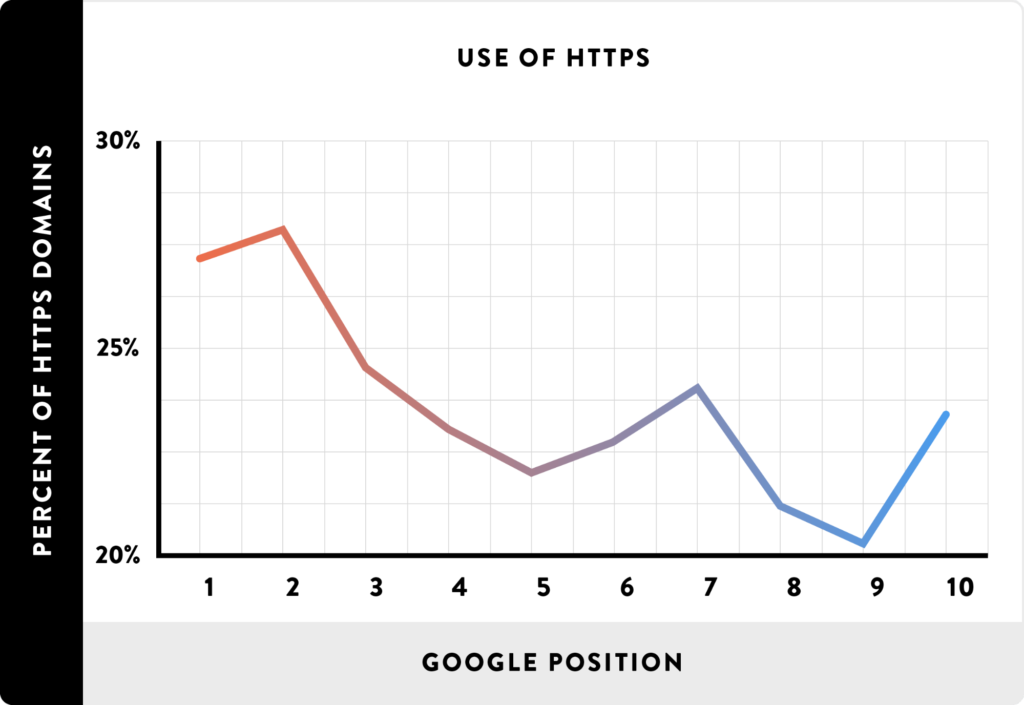
So it’s not a bad idea to add an SSL trust badge to your site so people know that you’re using HTTPS.

Nearly everyone can benefit from this. Finally, there’s the matter of privacy.
Facebook made major headlines about their privacy issues in 2018. The General Data Protection Regulation was also enacted in the same year, which dictates how companies within the European Union (or those doing business with companies within it) handle customer data. This means that privacy is something that’s on many people’s radars.
So it’s not a bad idea to let consumers know that you’re taking adequate measures to protect their privacy. TRUSTe is one of the best trust badges for addressing that.
8. Where to Place Trust Badges
There are two main places you’ll want to add trust badges. One is the checkout page.
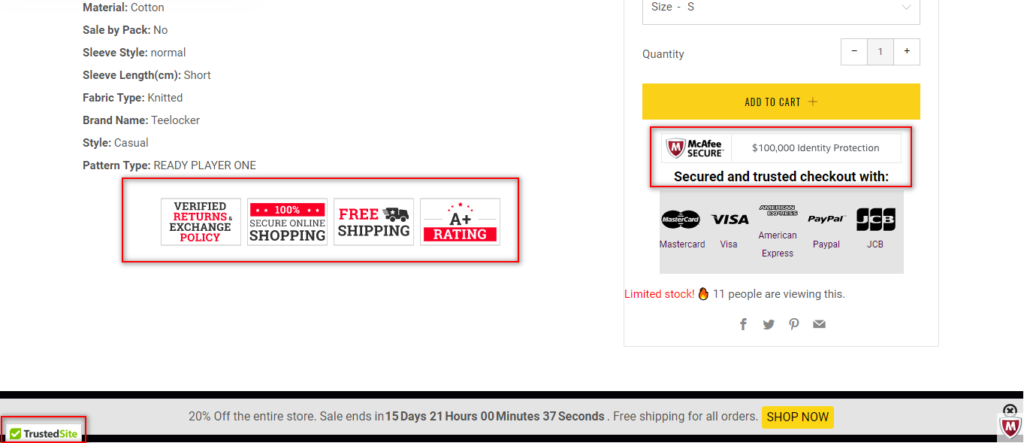
This helps people who were considering abandoning their shopping cart get over the hump. It creates trust at an incredibly important time and increases the likelihood that a customer goes through with the transaction. Usually, you’ll want to place them right near the checkout button. That way, a shopper’s eyes will naturally gravitate toward the trust badges.
The other is on landing pages when you’re asking for personal information.
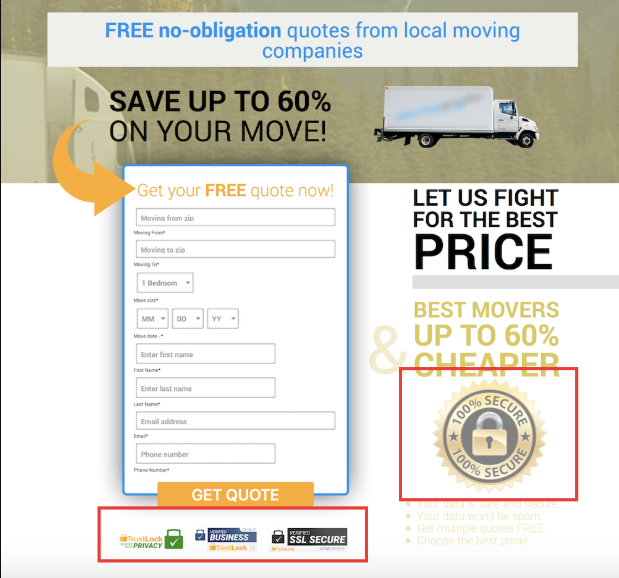
Remember that it’s not just payment card information that people are wary of sharing. It’s anything that can lead to identity theft. Their name, address, social security number, and even medical information can potentially be used by cyber-criminals. But you can set their minds at ease by strategically incorporating trust seals whenever you’re asking for sensitive information.
For landing pages, I generally recommend placing them within close proximity to the call-to-action (CTA). However, you’ll probably want to perform some A/B testing to see what the optimal location is.

Conclusion
It’s understandable that many customers are cautious when giving out personal information online. A growing number of data breaches have put them on edge.
Whether it’s their payment card information or simply their name and address, many need some coaxing before they feel comfortable, especially when dealing with a brand they’re unfamiliar with. And that’s where trust badges come in.
There’s no denying that they have a positive impact on conversions and sales and are great for quelling the fears of consumers. Multiple studies have proven this. The long-term boost in revenue should justify the investment. So I definitely recommend experimenting with them.



